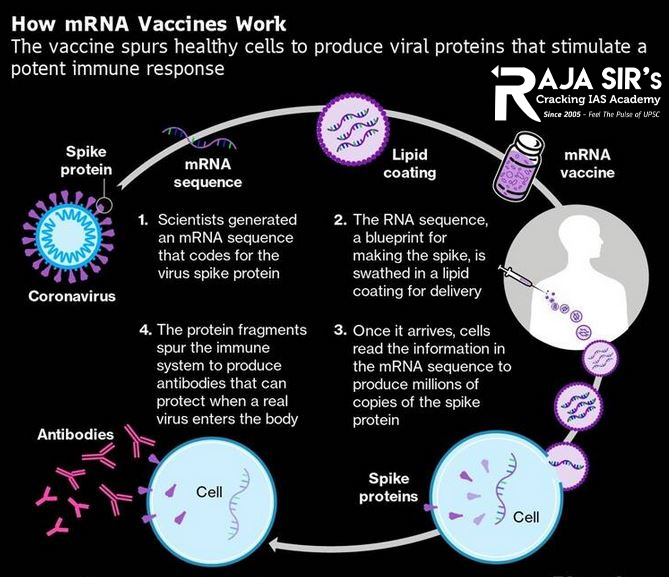- Home
- Prelims
- Mains
- Current Affairs
- Study Materials
- Test Series
What is mRNA vaccine?. Are mRNA vaccines "gene therapies"?
- Vaccines help prevent infection by preparing the body to fight foreign invaders (such as bacteria, viruses, or other pathogens). All vaccines introduce into the body a harmless piece of a particular bacteria or virus, triggering an immune response. Most vaccines contain a weakened or dead bacteria or virus. However, scientists have developed a new type of vaccine that uses a molecule called messenger RNA (mRNA) rather than part of an actual bacteria or virus. Messenger RNA is a type of RNA that is necessary for protein production. Once cells finish making a protein, they quickly break down the mRNA. mRNA from vaccines does not enter the nucleus and does not alter DNA.
- mRNA vaccines work by introducing a piece of mRNA that corresponds to a viral protein, usually a small piece of a protein found on the virus’s outer membrane. (Individuals who get an mRNA vaccine are not exposed to the virus, nor can they become infected with the virus by the vaccine.) By using this mRNA, cells can produce the viral protein. As part of a normal immune response, the immune system recognizes that the protein is foreign and produces specialized proteins called antibodies. Antibodies help protect the body against infection by recognizing individual viruses or other pathogens, attaching to them, and marking the pathogens for destruction. Once produced, antibodies remain in the body, even after the body has rid itself of the pathogen, so that the immune system can quickly respond if exposed again. If a person is exposed to a virus after receiving mRNA vaccination for it, antibodies can quickly recognize it, attach to it, and mark it for destruction before it can cause serious illness.

Significance of mRNA vaccines
There are two parts to our immune system: innate (the defences we’re born with) and acquired (which we develop as we come into contact with pathogens).
- Classical vaccine molecules usually only work with the acquired immune system and the innate immune system is activated by another ingredient, called an adjuvant.
- Interestingly, mRNA in vaccines could also trigger the innate immune system, providing an extra layer of defence without the need to add adjuvants.
mRNA vaccines aren’t gene therapies
- Gene therapies involve making deliberate changes to a patient’s DNA in order to cure or alleviate a genetic condition. This can be by adding a functional copy of a gene, disabling a gene that makes a faulty product or changing gene activation.
- The mRNA from the vaccines does not enter the cell nucleus or interact with the DNA at all, so it does not constitute gene therapy.
- Gene therapies can have long-lasting effects because they permanently change the cell’s DNA, with these changes being inherited by any daughter cells that result if the cell divides. In contrast, mRNAs are always transitory and are not inherited by daughter cells, making them ideal for use in vaccines.









 Latest News
Latest News
 General Studies
General Studies